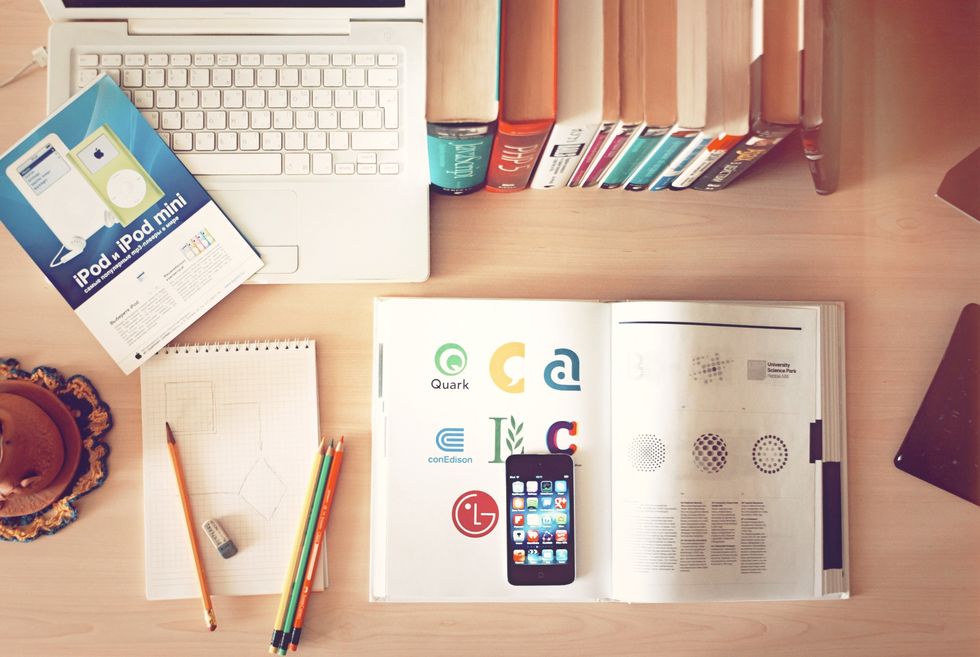Everyone procrastinates. I procrastinated my physics project. I procrastinated my math homework. I procrastinated my English stylistic evaluation of In Cold Blood by writing this article — and I procrastinated this article. While no one is immune to checking Instagram, replying to that text or just not even starting, there are a few hacks to get you started, keep you going and get you finished.
1. The Tried-And-True Pomodoro Technique

Think of the Pomodoro technique as treating yourself as a Pomeranian (yes, the dog). You're not going to make a soft ball of fluff work on calculus homework for two and a half hours straight, will you? Of course not. To train a dog, you give both intermediate and end-goal rewards. With the Pomodoro technique, decide on the task you want to do (like training a dog to sit). Set a timer for twenty-five minutes, and start. At the end of the twenty-five minutes, take a short, five-minute break.
Scroll through Instagram, go to the bathroom, walk around your room, then get right back into it. When you've finished the task (after however many iterations of twenty-five and five it takes), take a longer break, anywhere from a quarter hour to half an hour. Repeat until you're done with what you need to do. There's a reason they train Pomeranians — or really any animal — on a schedule. Treat yourself the same way.
2. Do The Hardest/ Most Daunting/ Worst Part First

You should start easy and work up to the harder stuff, right? Maybe for gym exercises or long distance runs, but for sure not with generic tasks you need to get done. Take homework. Say you go to school, then have an after-school sport, and get home around 5:30. You eat dinner, shower, do what you need to do and sit down to start homework at 6:30. Say you have three classes' work of homework. You're really good at English, okay at biology and just not great at math. Intuition says to start with the English and knock it out.
However, mentally, you only have so much gas in the tank. Yes, if you go in the reverse order you'll be dead tired by the time you get to the easiest stuff — but that's the idea. You were at a full tank for the hills and can (sort of) coast the rest of the way. It'll save you a lot of headaches right around 11:00 PM.
3. Stop Pretending You're a Multitasker

I'm sorry to burst your bubble, but studies have proven over and over that bouncing back and forth between different tasks actually worsens your ability to do any of the tasks you need to get done (USC Dornsife words it well, in case you don't believe me). Do one thing at a time.
You (hopefully) don't text and drive, and it's for that same reason. When you get distracted, you're still distracted mentally after you've stopped doing the thing that distracted you. That quick text can jam your brain function for up to ninety seconds after the fact. Bouncing between three different PowerPoints, two papers, a poster, and a podcast is a recipe for confusion and lots of heartache once you actually look at the work being done.
4. "I Work Well Under Pressure" is Always a Lie

Just because you can doesn't mean you should. We've all pulled off posters and projects due at midnight and starting that morning (or evening), and maybe you've even done quite well on the ones you put off. However, this is a horrible habit and one that's hard to break. First, your quality of work goes down when you scramble and cram (believe me or don't, it's the truth).
Second, what happens when you have not one, but two or three or five major end-of-the-year projects all do around the same time? One or two will turn out okay, and then you'll be taking summer classes to remediate your failing grade for the rest.
5. Technology Can Actually Help You

Apple, Google, Samsung, and other companies, under pressure from parents, teachers, and lawyers, have rolled out oodles of new features to get you, in the words of my father, "off your damn phone!" Instagram will now shut itself off and/or give you a reminder, while on Apple, you can set times for Do Not Disturb to go into effect or use Downtime, which shuts off all apps (except ones you select to remain on) until the morning.
The app Moment, both free and paid, works wonders to get you off your screen, tracks screen time, battery usage and trends (Apple does the same). Heck, you can even shut your screen completely off using certain apps so you're not able to access your phone at all. On the flip side, apps like Remind, Socratic, MyHomework and Desmos save lives, from communication with teachers to the organization to actually learning the material.
Yes, we all procrastinate, and in small doses, it can sometimes be a good kick in the butt to get moving. Just don't make it a habit — the world will keep spinning no matter what you do.

















